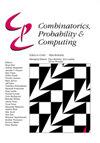最大弦子图
IF 0.8
4区 数学
Q3 COMPUTER SCIENCE, THEORY & METHODS
引用次数: 0
摘要
弦图是指不存在长度至少为$4$的诱导循环的图。设$f(n,m)$为最大整数,使得每个有$n$个顶点和$m$条边的图都有一个至少有$f(n,m)$条边的弦子图。1985年Erdős和Laskar提出了估算$f(n,m)$的问题。20世纪80年代末,Erdős、Gyárfás、Ordman和Zalcstein测定了$f(n,n^2/4+1)$的值,并对$f(n,n^2/3+1)$的值进行了推测。本文证明了这一猜想,并回答了Erdős和Laskar的问题,渐近地确定了$f(n,m)$对于所有$m$和对于$m \leq n^2/3+1$的精确。本文章由计算机程序翻译,如有差异,请以英文原文为准。
Maximal chordal subgraphs
Abstract A chordal graph is a graph with no induced cycles of length at least $4$ . Let $f(n,m)$ be the maximal integer such that every graph with $n$ vertices and $m$ edges has a chordal subgraph with at least $f(n,m)$ edges. In 1985 Erdős and Laskar posed the problem of estimating $f(n,m)$ . In the late 1980s, Erdős, Gyárfás, Ordman and Zalcstein determined the value of $f(n,n^2/4+1)$ and made a conjecture on the value of $f(n,n^2/3+1)$ . In this paper we prove this conjecture and answer the question of Erdős and Laskar, determining $f(n,m)$ asymptotically for all $m$ and exactly for $m \leq n^2/3+1$ .
求助全文
通过发布文献求助,成功后即可免费获取论文全文。
去求助
来源期刊

Combinatorics, Probability & Computing
数学-计算机:理论方法
CiteScore
2.40
自引率
11.10%
发文量
33
审稿时长
6-12 weeks
期刊介绍:
Published bimonthly, Combinatorics, Probability & Computing is devoted to the three areas of combinatorics, probability theory and theoretical computer science. Topics covered include classical and algebraic graph theory, extremal set theory, matroid theory, probabilistic methods and random combinatorial structures; combinatorial probability and limit theorems for random combinatorial structures; the theory of algorithms (including complexity theory), randomised algorithms, probabilistic analysis of algorithms, computational learning theory and optimisation.
 求助内容:
求助内容: 应助结果提醒方式:
应助结果提醒方式:


